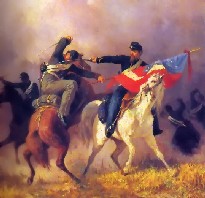


|

SECESSION
In the special session of the Georgia legislature that was called in November 1860 to consider secession, Robert Toombs, future Confederate Secretary of State, gave a forceful speech outlining the wrongs the South had endured. He recounted Northern political efforts to forever exclude slavery from Missouri, most of the Louisiana Purchase territory, California, and New Mexico.
"The South at all times demanded nothing but equality in the common territories, equal enjoyment of them with their property, to that extended to Northern citizens and their property -- nothing more. They said, we pay our part in all the blood and treasure expended in their acquisition. Give us equality of enjoyment, equal right to expansion -- it is as necessary to our prosperity as yours." But at every turn they met resistance. And this was not because free men didn't want to compete with slave labor -- they didn't, but these were almost entirely agricultural territories. It was not because settlers from free states were bent on excluding all blacks, free and slave, from the territories -- even though they were. Instead, as Toombs told it, this amounted to a policy, and the policy was explicit in the Republican Party platforms. The target of the policy was not the West, but the South. From 800,000 slaves in the South in 1790, there were more than 4 million in 1860.
"The country has expanded to meet this growing want, and Florida, Alabama, Mississippi, Louisiana, Texas, Arkansas, Kentucky, Tennessee, and Missouri, have received this increasing tide of African labor; before the end of this century, at precisely the same rate of increase, the Africans among us in a subordinate condition will amount to eleven millions of persons. Sen. Toombs and a great many other men of the times knew that African slavery presented the South with a complex burden. It couldn't just be dropped, and in fact to cut it off and hem it in, as the Republicans proclaimed they would do, would have caused a crisis and could have brought on open war between blacks and whites. Marx realized this when he wrote his dictum that the American Civil War was fought over slavery. He wrote that a "strict confinement of slavery within its old terrain," cut off from any possibility of expansion, would cause it to reach a crisis and collapse the entire social system of that region of America. Of course to Marx, with his class consciousness, this meant the "so-called poor whites" would rise against the planter class. And as a European and a socialist, he approved. The Southerners saw the same case, but the outcome in their minds was Haiti; slave rebellion that would wipe one or the other race clean off the earth of the Deep South. It was openly discussed in North and South whether white or black would triumph in what was to come. The wire-pulling over the Morrill tariff bill in 1860 showed the party of the abolitionists cynically using a legitimate government mechanism to gain power in a presidential election. It indicated to the South what this party would do once it got its hands on the U.S. military and on the financial machinery of the nation. Legality My reading in the Founders (Jefferson, Madison, Adams, Washington), not just in excerpts but in entire correspondences and publications, makes me think they would have regarded the dissolution of the United States, under any circumstances, as a great tragedy, and the undoing of all they had worked and sacrificed to create. Yet they did not forbid it. They had the opportunity to do so, when they wrote the Constitution in 1787, and they let it pass. They had the opportunity throughout the next two generations, when America was essentially governed by the men who had crafted the Constitution. Adams, Madison, Jefferson certainly during their presidencies did not shy from attempts to modify the government they had created. (I get the feeling they regarded the Constitution as a lot more organic and fluid than we do today, open to rewriting and evolution, but that's a topic for another place). In Washington's "Farewell Address," he told the citizens of the United States that union was "a main Pillar in the Edifice of your real independence," and something to be carefully guarded. But if he had thought it was inviolable, he would have simply said so, and not spent so much time pleading with Americans to think of themselves as a single nation and to foster good relations between the regions. The union, Washington wrote, was an experiment, albeit one that should be given time to prove itself. " 'Tis well worth a fair and full experiment. With such powerful and obvious motives to Union [he's just listed some of them], affecting all parts of our country, while experience shall not have demonstrated its impracticability, there will always be reason, to distrust the patriotism of those, who in any quarter may endeavor to weaken its bonds." In 1803, Federalists objected to the Louisiana Purchase because it would make the nation too large. True democracies must be small, according to received wisdom, and a nation so large as the United States were becoming would either lose its institutions or split. The idea did not bother Thomas Jefferson. "Whether we remain in one confederacy, or form into Atlantic and Mississippi confederacies, I believe not very important to the happiness of either part. Those of the Western confederacy will be as much our children & descendants as those of the Eastern." He wrote that if those of the Mississippi valley should "see their interest in separation, why should we take side with our Atlantic rather than our Mississippi descendants? It is the elder and the younger son differing. God bless them both, & keep them in Union, if it be for their good, but separate them, if it be better." [1] During the War of 1812, when New England was making a serious bid to separate from the Union, Adams and Jefferson, as retired presidents, corresponded about this effort, and the personalities behind it. Both men thought it a foolish bid by petty minds who put selfish and regional interests over national good. Jefferson wrote as much, too, in a letter to Lafayette in France. But nowhere did either man write anything like, "The states can't secede because it's not constitutional to do so." They did not call it illegal, in public or private. They did not claim the union of states was legally unbreakable. During the South Carolina nullification crisis of the early 1830s, I see the same thing in the public and private writing of Madison (Jefferson and Adams both being dead by then, of course). He deplores the drift toward disunion; he says the crisis at hand does not rise to the level of anything that would justify secession -- but he does not deny the right to secede. I think the Founders left that door unlocked, and prayed (to a non-denominational "providence") that it would never be needed or used. The Virginia and Kentucky Resolutions, often cited to show the Founders' support for the right to secede, read like a desperate bid to hold the country together in the face of a deplorable drift toward federal tyranny over the states.
1. Letter to Joseph Priestley, Jan. 29, 1804; Ford, Writings of Thomas Jefferson, 8:295.
|
| �2002Douglas Harper | "When misunderstanding serves others as an advantage, one is helpless to make oneself understood." -Lionel Trilling |